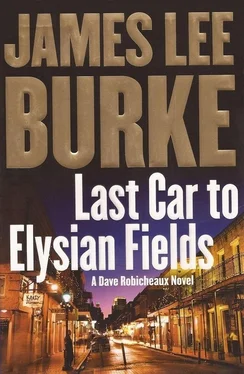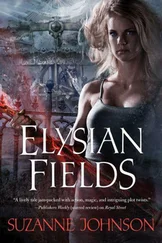Why had he taken this job? It was jinxed from the start. New Orleans wasn’t a city. It was an outdoor mental asylum located on top of a giant sponge.
Get a hold of yourself, he thought. Take care of business, do a proper job of it, and never come back here again. It was almost 6:00 P.M. and the sky outside was absolutely black. The priest had finished his afternoon stint in the confessional and was no doubt having his supper, Max told himself. If the priest was true to his schedule, he would be saying his evening prayers in a front pew soon, his wide back presenting itself in lovely fashion to Max’s crosshairs up in the choir. It was all going to be neat and tidy, nothing personal involved, no unnecessary pain. We all got to earn our keep, Father, he said to himself.
Max waited until the vestibule was empty, then darted up the side stairs into the choir area. Ah, that was easy enough, he thought, looking down on the half dozen or so old people praying in the pews.
Through a side window he saw lightning leap above the adjacent rooftops, illuminating the fire escape and the alleyway down below. Max did not like lightning. It brought back memories and catechism lessons he saw no point in reliving. He blew his nose softly, unbuttoned his raincoat, and unsnapped the carbine from the sling under his armpit.
When he sat down in a chair among a pile of hymnals in the corner he unconsciously glanced upward at the celestial paintings on the ceiling, then quickly shifted his attention back to the nave of the church before he got lost in troubling thoughts that would be of no help in concluding the business at hand.
He surveyed the marble pillars, the tapestry-draped banisters on the balconies, the apse over the altar, the hand-carved pulpit. The place looked like it had been transported from the Middle Ages and dropped from a hundred-thousand feet into the middle of a slum, he thought.
Even the parishioners could have been street beggars out of the fifteenth century. All the place needed was Quasimodo swinging on the bells. What was the matter with these people? Hadn’t they heard of modern times? And how about this Father Dolan, threatening him with physical violence over the telephone? Now, that was a sad state of affairs, an Irish-American priest berating a man who had worked in the service of the IRA. Pitiful, Max thought.
“What are you doing, Mister?” a little boy’s voice said.
Oh shite , he thought.
“Are you here for choir practice?” the child said. He was not over nine or ten and wore long pants and a white shirt with a tie. His hair was wet and freshly combed, his nails pink and trimmed.
Max closed his raincoat, covering his carbine. “Choir practice? Not exactly,” he said.
“Then what are you doing?”
“Examining the roof for rain leaks. I work for the bishop.”
“How come you’re all wet?”
“I told you. Now get lost.”
“I’m here with my mother for Father Jimmie’s choir practice. I don’t have to do what you say.”
“Now, you listen, you malignant pygmy—” Max said.
“Screw you,” the little boy said.
Max coughed violently into his palm. His head was splitting, his nose running. “Here’s five dollars. Go buy yourself a hot chocolate,” he said.
“Screw you twice,” the little boy said.
“How would you like your dork stuffed in a light socket?” Max said.
“Make it ten bucks,” the little boy said.
“What?”
The little boy peered over the balcony. “Here comes Father Dolan now. Ten bucks or I start screaming,” he said.
Max shoved the money in the boy’s hands and watched him run down the stairs. The little bastard, he thought. I hope the vendor pours Liquid Drano in his hot chocolate.
Then Max heard footsteps, many of them, clopping up the wooden stairs.
Either this is not happening or I’m being fucked with a garden rake, he thought.
He jerked open the window on the fire escape and climbed outside into rain that was now mixed with hail, closing the window halfway behind him. The icy pellets pounded his head, scalded his face, and slid down his coat collar inside his clothes. And if that wasn’t enough, a bolt of lightning crashed into the alley, filling the air with the stench of sulphur and scorched electrical wiring. Jesus God, why was this being visited upon him? Then he looked down below and realized there were no steps below the fire escape, only rusted fastenings in the stone wall where a steel extension had once been in place. He was trapped like a rain-soaked parrot on a perch in an electrical storm, while inside the church Father Dolan’s parishioners were dry and warm, passing out hymnals to one another.
Well, maybe it was time to spread the discomfort around a little bit, forget neat and tidy and simply splatter the good father’s porridge and be on his way, Max thought. Why not? Click off the safety, burn the whole magazine if need be, then haul ass right through the choir and on downstairs into the street. Father Dolan’s singing parishioners would be too busy climbing under the furniture or shaking the crab cakes out of their drawers to worry about describing Max Coll to the authorities.
He knelt down in a shooting position on the fire escape, squinted into the carbine’s scope, and saw the priest’s magnified face swim into the crosshairs. In fact, the magnification of the priest’s head was so great Max could not make out detail but see only hair and skin and perhaps just a touch of beard stubble. The hail clattered and danced like mothballs on the steel mesh of the fire escape, stinging the backs of Max’s hands, drumming softly on his cap.
The carbine was loaded with soft-nose rounds and two of them impacting inside the priest’s face would undoubtedly blow the back of his head into the wall like pieces from a broken watermelon. Max ground his molars, breathed hard through his nose, and felt his finger tighten inside the trigger guard. Squeeze it off, he told himself. Do it, do it, do it.
But he froze again, his hands trembling, just as they had trembled inside the confessional.
He was disgusted with himself. As he started to get to his feet, the silencer on the muzzle of the carbine scraped against the window glass.
Suddenly he was not only looking straight into the priest’s face, the priest was actually charging toward him.
There was no place to run. The priest jerked the window open, ripped the carbine from Max’s hands, then gripped the stock with both hands and drove the steel-plated butt into Max’s mouth. Max felt his lip burst like a grape against his teeth, then the guardrail behind him peeled from its fastenings. In the wink of an eye he was plunging backward through space, his arms outspread, preparing himself for the impact on the brick-paved alley below.
Instead, he crashed into the middle of an opened Dumpster loaded to the gunnels with rotten produce and the leftovers from a parish shrimp boil. He stared upward from the garbage like a crucified man, right into the angry face of Father Dolan, who peered down at him from the edge of the broken fire escape. Max extracted himself from the softness of garbage that seemed to be sucking him into its maw and began pulling himself over the side of the Dumpster.
“Don’t forget this,” he heard Father Dolan call.
Max looked up in time to see his carbine plummeting through the rain and hail, just before it bounced off his uplifted face.
On Thursday morning I took the four-lane into Franklin, then checked in with the St. Mary Parish Sheriff’s Department and was given directions to the home of William Guillot. It was a lovely old Victorian house, located in a tree-covered, residential neighborhood, one of deep green lawns and hydrangeas and impatiens blooming in the shade and wide galleries hung with porch swings. But the gardener told me Guillot wasn’t there and I could probably find him at the subdivision he was building not far from the four-lane.
Читать дальше












